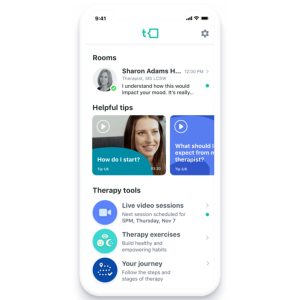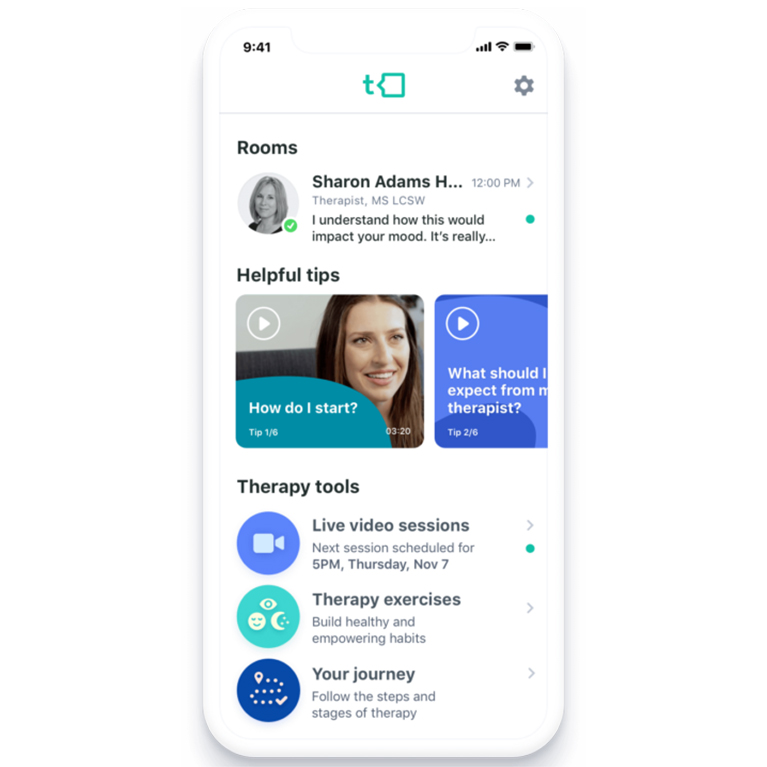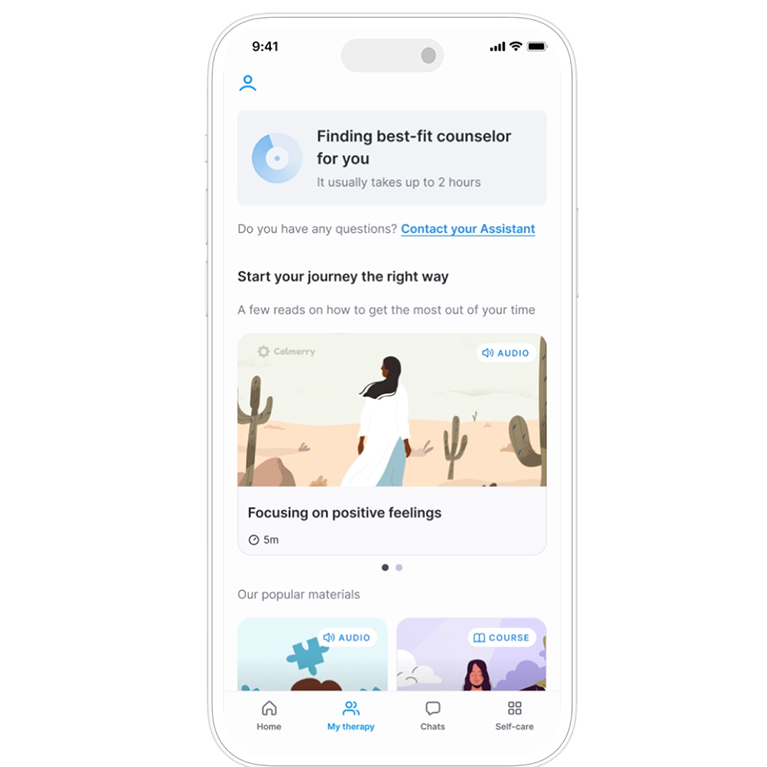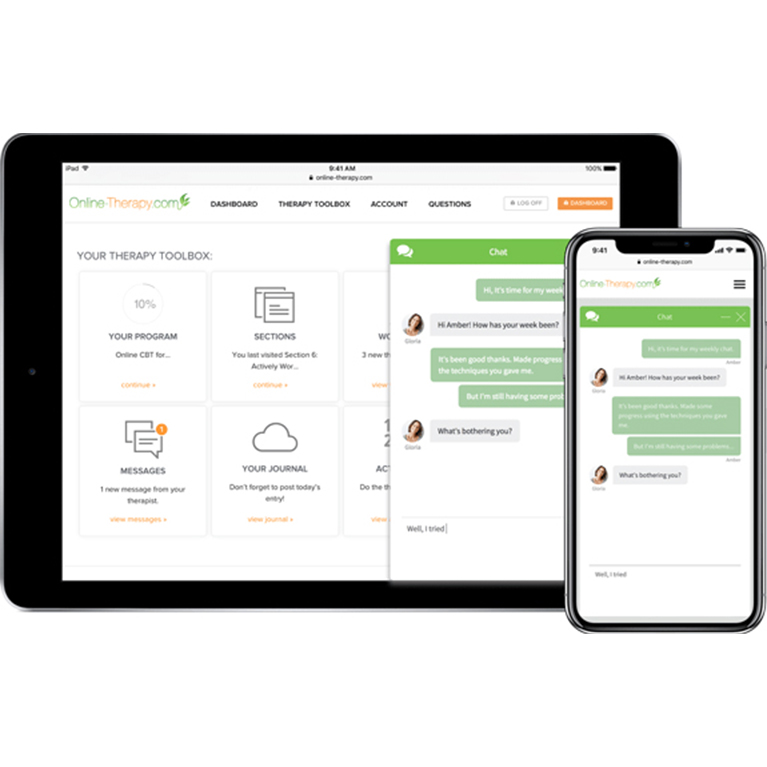Online therapy platforms have grown substantially since the pandemic, allowing more individuals and their loved ones to access mental health services that they otherwise may not be able to receive. This is significant, as one in five adults and 17% of youth experience mental illness. (1, 17) Mental health challenges are complex, affecting daily functioning, activities, and overall well-being and health.
While having more options available for psychotherapy is a good thing, it’s important to keep in mind what these platforms provide in terms of their full range of clinical services, what sets them apart, and what makes them an appropriate fit for the individual seeking treatment based on their own unique needs and preferences.
“Therapy platforms are as unique as the individuals accessing them,” said therapist Rychel Johnson. “So many people need access to mental health therapy. It’s great that so many options and types of therapists are available online for people who need support.”
Talkspace has emerged as a well-respected psychotherapy platform, providing services for teens and adults of all ages. Unique features, including the option for users to leave their therapists text or audio messages, in addition to scheduled live video sessions, allow the individual to be engaged in their therapy treatment in and out of session. This also helps users become invested in their therapy treatment process, gaining insight into their thoughts and emotions that may surface outside of their scheduled sessions. Users can share insights, developments, progress, or even struggles they have endured.


Key product features
What you should know
This platform provides connection for many individuals suffering from their mental health through the form of live video sessions, phone calls, and texts.
- Evidenced-based therapies include CBT, DBT, ACT, Psychodynamic, and Somatic Therapies.
- Users get personally matched with licensed therapists with diverse specialties to support a range of mental health conditions.
- Users are provided with ongoing support between sessions, sharing progress, setbacks, or difficulties while logging important observations that can reveal key clinical insights.
- In some cases, the therapy process can begin in as little as 48 hours, depending on user availability and the availability of their matched therapists with the desired specialty.
What is Talkspace?
Talkspace is an online therapy platform offering diverse evidence-based modalities for a range of mental health conditions. It allows users to monitor their experiences, thoughts, feelings, and insights between sessions from the comfort of their homes or devices, making them flexible and convenient.
This is important as users can bring this clinical information to their sessions with their therapist or even use it as notes for observing progress and forming connections that allow for growth in the therapeutic process. Encouraging the user to play an active role in their therapy process empowers them to be mindful of their experience and get to know themselves deeper, fostering self-confidence and increased insights. Users can get more out of and between sessions with these communication tools.
Talkspace uses a thoughtful algorithm to match new clients to therapists based on unique intake questionnaires and preferences, ensuring an effective therapy process.
Talkspace offers these therapy modalities:
- Cognitive Behavioral Therapy (CBT), which is well-documented for improving a range of mental health conditions, such as anxiety and depression. (2, 3, 4)
- Dialectical Behavioral Therapy (DBT). Similarly, DBT has been well demonstrated to support individuals experiencing borderline personality disorder (BPD) in addition to substance use disorder and post-traumatic stress disorder (PTSD), among other conditions. (5, 6)
- Emotion-focused therapy (EFT) for eating disorders and substance use disorder. (7, 18)
- Exposure therapy, which may be appropriate for individuals with OCD or social anxiety
- Grief counseling to help those experiencing a loss explore their emotions and develop coping strategies.
- Mentalization-based therapy, which is also implicated to be supportive for those with BPD. (8)
- Psychodynamic therapy which encourages the processing and expression of difficult emotions. (9)
- Somatic therapy or exploring the mind-body connection and mindfulness. (19)
- Humanistic therapies such as Acceptance & Commitment Therapy (ACT) which is great for grounding into our values and making choices that align with those, incorporating mindfulness. (20)
Specs
| Platform | Video therapy sessions, mobile app |
| Ages | 13+ (if under 18 years of age, guardian consent is required) |
| Session type | Live video, live calls, audio messages, text messages |
| Treatment options | Psychotherapy and medication |
| Monthly cost | From $276-$436 per month (depending on subscription) |
| Availability | Users are matched with a therapist within 48 hours |
| Providers | Licensed therapists and psychiatric providers |
What our experts say
“Being able to access an ideal therapeutic match online is valuable,” says Johnson regarding Talkspace’s online offerings. “Before beginning therapy with Talkspace or any other online platform, ensure you’re ready to invest in your mental health–not in cost alone, but in devoting time for sessions and homework between sessions. It’s possible to feel better by accessing online therapy if you truly show up for yourself.”
What customers are saying
A look at reviews on Trustpilot revealed several satisfied Talkspace users. Many users report that their therapists provide them with effective tools, helping to yield efficient clinical progression.
Talkspace user “Shannon B” said, “I have been on quite a journey of healing since 2022. My therapist has given me such great tools, resources, and sound guidance to help with getting through PTSD, family & work issues, and coping with day-to-day life struggles.“
“Dennis E” also echoes that his providers have been instrumental in navigating his mental health challenges. He said, “I found two amazing people on Talkspace. Tim Welch, my therapist, has become a go-to and always keeps it real. He will be my psychologist for a long time. Barbara, my psychiatrist, is amazing, friendly, and easygoing but very knowledgeable and responsive. They are helping me navigate a very rough and tricky multiple-medication reduction carefully but with a purpose, agenda, and goal. I finally feel like I can see the other side of the long tunnel I’ve been in for over two years.”
However, a few users, like Thomm, indicate logistical concerns with the platform that prevent therapy from occurring. He said, “My therapist is okay, and we work well together—or we would if the infrastructure of Talkspace would let us. This is the second time this service has been so broken that I could not hear him. Instead of a face-to-face session, I had to pay to text with him after wasting a quarter of the session trying to get the audio working without success. We both deserve better than this. I cannot get the work done that I want to if I cannot communicate with my therapist.”
Our Talkspace experience
As a therapist, I found my experience with Talkspace to be positive overall. With so many individuals struggling with mental health difficulties, often in silence and frequently experiencing barriers to receiving high-quality treatment, the Talkspace platform provides therapy services to a range of youth and adults who may otherwise not receive them. While the stigma surrounding mental health is diminishing, many individuals still may experience stigma in seeking mental health treatment.
Talkspace offers mental health therapy services through various communication methods from the convenience and privacy of users’ homes. The signup process from the website is pretty seamless. They ask what type of therapy you’re looking for and inquire about your insurance. Then, users can go through some initial screening questions to determine which one matches their provider. Your therapist will review your initial treatment goals and compassionately listen to you.
Individuals may also communicate with their therapists anytime, supporting emotional identification, regulation, and mind-body attunement. (10) In the long term, logging this observational information on the app can support the therapy process, as users can work through their emotional activation and gain increased awareness of how their body and mind respond to this distress. It, therefore, can identify healthy coping skills to implement with their therapist. (11) Over time, this helps to empower the individual in their therapy process, in and out of session, which I love.
The communication and video aspect of Talkspace supports the needs of those who have difficulty leaving their homes, obtaining transportation or childcare, or having busy work schedules—all of which can be further barriers to obtaining mental health treatment.
Finally, for those who may be somewhat reluctant to begin therapy, these various forms of communication can help individuals find what feels comfortable for them. This can be paramount in establishing trust and confidence in oneself for beginning the therapy process, trust in the therapeutic process, and rapport with one’s provider.
Furthermore, individuals can learn more about themselves simply by becoming more mindful and curious of their feelings and thoughts and more attuned to their bodies by documenting between sessions. Bringing awareness to our body’s sensations, connecting these with our thoughts and emotions, and learning what our body needs are important in therapy. (12)
Bringing these insights to our sessions and logging our progress and observations can help us to gain insight into not only what we need to nourish our bodies—rest, movement, nutrition, sunshine, nature, connection with others, deep breathing, or meditation, to name a few—but also what is emotionally activating and/or what physiologically induces sympathetic nervous system activation. While these holistic modalities are often not addressed in traditional conventional therapy, they are also imperative to implement to promote balance between the body and mind. With this information, we can recognize appropriate coping methods, such as deep breathing, mindfulness, meditation, DBT, CBT, and ACT. This helps support us with emotional regulation and mindfulness. (13)
Individuals can work with their therapist to unpack conditioned beliefs using CBT, ACT, and other modalities. This is important as chronic stress can induce some alterations in the body, including dysfunction in the nervous system, hormones, gut microbiome, and immune system, as well as increased levels of inflammation. (14)These physiological changes from chronic stress can further wreak havoc on balance in the body. (15)
Working with a therapist through communication modalities that align for the individual supports an awareness of and improvement in mental health in these ways. Talkspace’s therapists are licensed and credentialed, many with various specialties. This is important as it provides diverse modalities that support multiple users’ therapy processes. Users can also request to swap therapists if they find their therapist isn’t the best fit.
How we test online therapy
As a fellow therapist who has sought therapy, I focus on several key areas when evaluating teletherapy platforms to ensure quality and effectiveness in delivering mental health services. You can also check out our full teletherapy testing methodology here.
Therapist quality—30%
A high-quality teletherapy service should connect users with certified and experienced, compassionate therapists, ensuring that interactions feel personal and individualized rather than generic. After all, no one size fits all regarding effective therapy. We prioritize expertise and the therapist’s ability to address the individual’s multifaceted needs, as well as the overall quality of interaction between the therapist and the client. Therapy modalities are also significant in our reviews.
Here’s what we look for:
- Expertise
- Personalization
- Interaction quality
Accessibility and convenience—30%
Teletherapy can significantly enhance an individual’s ability to engage with mental health services, particularly for those facing challenges like scheduling conflicts, transportation issues, or other confounding factors. This is of utmost importance as seeking quality mental health treatment shouldn’t be difficult or stigmatized.
We evaluate:
- Ease of use
- Availability
- Platform reliability
Cost and value—20%
Cost and value reflect the financial barriers many face in accessing mental health care. Here’s what we factor into a teletherapy’s cost and value rating:
- Pricing transparency
- Insurance and coverage
- Value for money
Support and resources—10%
We recognize that mental health care extends beyond individual sessions. Access to supplementary materials and ongoing customer support is vital for reinforcing therapeutic gains.
Our factors in this rating include:
- Supplementary materials
- Customer support
- Aftercare
Privacy and security—10%
Privacy and security are imperative, as maintaining client confidentiality and data security is significant in teletherapy. We look for compliance with HIPAA regulations, strong encryption methods, and options for user anonymity to protect sensitive client information.
Here’s what we’re looking for:
- Compliance with HIPAA and data protection laws
- Encryption and security measures
- Anonymity options
Compare Talkspace

|

|

|

|

|
|
| Talkspace | BetterHelp | Brightside | Calmerry | Online-Therapy.com | |
| Rating | |||||
| Best for | Unlimited messaging | Diverse therapists | Structured tools | A thorough resource library | Comprehensive information |
| Cost | $276-$476 per month | $280-$400 per month | $95-$349 per month | $228–$360 per month | $50-$110 per week |
| Session type | Live video calls, phone calls or chat, and unlimited messaging | Live video calls, phone calls or chat, and messaging | Live video calls with unlimited messaging | Video messaging or both | Video Messaging, voice, and text |
| Ages treated | 13+ (with parent/guardian consent) | 18+ | 18+ | 18+ | 13+ (with parent/guardian consent) or 18+ |
How does Talkspace work?
Talkspace is an online therapy platform that connects users with licensed therapists through text, video, and audio messaging. This platform supports users’ progress in therapy by encouraging them to reflect between sessions and capture these insights via documentation directly to their therapist. Users can do this with text, audio, and video messaging. This helps users truly engage with the process.
Users create an account and complete a treatment intake questionnaire regarding their medical and mental health history, emergency contact information, and specific needs and preferences. This also includes an inquiry on medication history or needs to determine if psychiatry provider services are warranted. This is an important part of the process for many individuals struggling with their daily functioning.
For some, medications can help individuals feel better, think clearer, and cope with daily life. For these reasons, clinically relevant medications can be an important part of treatment in conjunction with foundational aspects of collective health—body and mind—including sleep, nutrition, sunlight exposure, and movement.
Based on the information provided in the questionnaire, Talkspace matches users with a licensed therapist who specializes in their areas of concern and preference. Talkspace therapists have various areas of expertise. If medication is warranted, the user will meet with a psychiatric provider to determine which medication is best for the individual. Please note that controlled substances are not prescribed.
Once matched, users can communicate with their therapist through secure messaging. They can send texts, audio messages, or video notes at their convenience. Live scheduled video sessions with the matched therapist are also provided between one and four times per month, depending on the user’s plan.
Psychiatric services will also be added to the plan if medication is warranted. The user will have a live video session with the prescriber once every three months to follow up regarding their medication in addition to their usual therapy services.
Individuals can send text messages, audio, or video clips to their therapist, who is expected to respond five days a week. The therapist responds to messages and offers support, guidance, and coping strategies. Sessions can be ongoing depending on the user’s clinical needs and preferences, with therapists providing feedback and helping users work through their issues.
Talkspace offers various subscription plans, allowing users to choose the one that best suits their needs and budget. These plans include different levels of messaging and video session access. For example, the video and messaging therapy plan includes four thirty-minute live sessions per month. In contrast, other plans may offer just one live video session a month with other forms of communication. Talkspace accepts the following insurances: Aetna, Anthem, Cigna, and Regime. Users should call their insurance to determine if Talkspace is covered before starting treatment.
Talkspace prioritizes user confidentiality and uses encryption to protect personal information and HIPAA.
Related: The Best Online Therapy Platforms That Take Insurance
Who is Talkspace right for?
This platform is ideal for users seeking mental health support. It’s great for users who value the platform’s convenience and comfort more than in-person sessions. Talkspace also provides phone and text sessions, which could be an ideal starting place for individuals struggling with social anxiety or other conditions that exclude in-person therapy. Talkspace is not right for those seeking immediate clinical crisis relief or hospitalization.
Who should seek an alternative to Talkspace
While this platform offers a wide array of services, individuals who prefer in-person therapy should seek an alternative to Talkspace. Individuals requiring higher clinical needs, such as those needing immediate crisis management or presenting with complex diagnoses—such as schizophrenia or psychosis—should also seek an alternative to this therapy platform. People with eating disorders may also wish to seek in-person care, according to Johnson.
Furthermore, individuals warranting higher levels of clinical support, such as partial hospitalization or inpatient care, should not consider this app as a primary treatment. Talkspace may be great in conjunction with other mental health treatments for individuals who need this higher level of clinical support.
Please reference The National Hotline For Mental Health Crises And Suicide Prevention Link if you need clinical support.
Can Talkspace prescribe medication?
Yes, there are prescriber modalities on Talkspace that allow for medication prescription if warranted. If medication is appropriate for treatment, the individual will meet with a psychiatric provider to find a medication that supports the patient in feeling better and functioning better.
Talkspace offers medication for varying mental health conditions. Typically, the copay for in-network insurance is $15. There is also no referral necessary to help expedite the process. According to Talkspace, most users can see a provider within a week.
Can I receive a mental health diagnosis through Talkspace?
Yes, individuals can receive a mental health diagnosis through Talkspace. Diagnoses on Talkspace are typically determined through a structured process that involves initial assessments and video session evaluation. Here’s an overview of how this works:
Initial assessment questionnaire: Upon signing up, clients complete a detailed questionnaire that gathers information about their mental health, medical history, previous symptoms, and primary concerns.
Therapist evaluation: After being matched with a therapist, an initial session (which can be text-based or via video) is often conducted. The therapist discusses the questionnaire responses in more depth and explores the client’s experiences and symptoms.
Clinical interviews: The therapist conducts clinical interviews to gather comprehensive information about the client’s mental health. This includes discussing current symptoms, duration, triggers, and any previous treatments.
Diagnostic criteria: Therapists use established diagnostic criteria, such as those from the DSM-5-TR (Diagnostic and Statistical Manual of Mental Disorders), to evaluate symptoms against recognized mental health disorders. (16)
Collaboration with prescribers: If users opt for the Prescriber Plan, a licensed prescriber (psychiatrist or nurse practitioner) will also conduct an assessment or medication evaluation. This includes reviewing the client’s history and discussing symptoms to determine the appropriateness of medication and the presenting concerns and symptoms.
Integrated care: Therapists and prescribers can collaborate to ensure that therapy and medication management align with the client’s treatment goals. Ideally, holistic and foundational aspects of health are also discussed, including sleep, nutrition, exercise, connection with others and nature, and sun exposure.
Ongoing assessment/progress monitoring: Throughout the therapeutic process, therapists regularly assess the client’s progress and symptom changes. This may involve periodic check-ins and adjustments to the treatment plan as needed to ensure progress toward established goals.
Clients are encouraged to provide feedback on their experiences, which can inform the therapist’s understanding of the client’s needs and the effectiveness of the current approach.
Referral to specialists/complex cases: If a therapist identifies symptoms that suggest a more complex issue or co-occurring disorders, they may refer the client to a specialist for further evaluation and treatment.
Diagnoses in Talkspace are determined through a collaborative and thorough process that includes initial assessments, DSM-5-TR criteria, clinical interviews, and ongoing evaluations. This approach helps ensure clients receive appropriate and personalized care based on their unique needs.
Types of plans offered by Talkspace
Messaging therapy plans
These plans primarily focus on text-based communication with a therapist.
Messaging therapy:
- Price: Approximately $276 per month (pricing may vary by location).
- Features: Users can send unlimited text, audio, and video messages to their therapist. Therapists typically respond daily, providing ongoing support.
- No live sessions are available under this plan.
- Users can purchase extra live therapy sessions for $65 each.
Live therapy plans
Users receive the same benefits of the messaging therapy plan but with up to four 30-minute live therapy sessions per month.
Video + messaging therapy:
- Price: Approximately $396 per month (pricing may vary).
- Features: Users receive one live video session per week and unlimited messaging with their therapist.
- Users can purchase extra live therapy sessions for $65 each.
Video + messaging + workshop therapy:
- Price: Approximately $436 per month (pricing may vary).
- Features: Users receive one live video session per week and unlimited messaging with their therapist, plus weekly workshops.
- Users can purchase extra live therapy sessions for $65 each.
Couples therapy
For couples looking to address relationship issues, Talkspace offers specialized plans.
Couples therapy:
- Price: Typically starts at around $396 per month.
- Features: This package includes one live session each week and unlimited messaging for both partners, facilitating joint communication with a therapist.
If you’re interested in relationship counseling, check out our best online therapy services for couples.
Talkspace pricing
Prices can vary based on insurance coverage, plan, location, therapist expertise, and ongoing promotion.
Insurance coverage
Talkspace also partners with insurance providers, allowing users to check if their plan covers therapy sessions. This can significantly reduce out-of-pocket costs. Contact your insurance provider to ensure you’re covered before starting Talkspace.
Important considerations
- Trial period: Talkspace may offer a trial period or introductory pricing for new users, allowing them to experience the service before committing fully.
- Flexibility: Plans are typically billed monthly, but users can upgrade or change their plans as needed.
How therapists are onboarded
The onboarding process for therapists at Talkspace ensures that only qualified and competent professionals provide care while maintaining the platform’s standards. This rigorous process helps maintain the quality and safety of mental health services offered through the platform.
Here’s an overview of how therapists are onboarded:
Application process
Initial application: Interested therapists fill out an application form that requires basic information about their qualifications, experience, and areas of expertise.
Credential verification: The Talkspace team verifies the therapist’s credentials, ensuring they hold the necessary licenses and certifications to practice in their respective states.
Interviews and assessments
Interviews: Qualified candidates participate in interviews with Talkspace’s clinical team. This allows the company to assess the fit for the platform, including their therapeutic approaches and understanding of remote therapy.
Assessment of clinical skills: Candidates may be evaluated on their clinical skills, including their ability to provide evidence-based care and their understanding of the platform’s technology.
Background checks
Professional history review: A thorough review of the therapist’s professional history is conducted, including checking for any past disciplinary actions or malpractice claims.
Criminal background check: Therapists undergo a criminal background check to ensure the safety and trustworthiness of professionals working with clients.
Training and orientation
Platform training: Once accepted, therapists receive training on how to use Talkspace’s platform effectively. This includes navigating the software, managing client communications, and utilizing tools for therapy sessions.
Policy and procedure orientation: Therapists are educated about Talkspace’s policies, including confidentiality (HIPAA), ethics, and best practices for online therapy.
Ongoing support and supervision
Peer support: Therapists are encouraged to engage in peer consultations for case discussions and support.
Continuing education: Talkspace may provide ongoing training and professional development opportunities to keep therapists updated on best practices and emerging trends in mental health care.
Performance monitoring
Client feedback: After onboarding, therapists receive feedback from clients, which helps assess their effectiveness and identify areas for improvement.
Regular reviews: Talkspace conducts periodic reviews of therapists’ performance and progress.
How many therapists are on the platform?
From public data available in 2024, it’s estimated that over 5,000 therapists exist on the Talkspace platform, underscoring the platform’s therapist diversity. (21)
Onboarding new users
Users are onboarded with a series of questionnaires and options to ensure the platform is an ideal fit based on their needs and individual preferences.
How are new users matched with a therapist?
New users are matched with a therapist based on their clinical needs—as determined by the intake questionnaire—the therapist’s expertise or specialty areas, as well as the user’s preference and both the user and therapist’s schedule.
BetterHelp vs. Talkspace
Choosing between BetterHelp and Talkspace largely depends on individual preferences, needs, and budget. Both BetterHelp and Talkspace are popular online therapy platforms, but they have some key differences in services, pricing, and overall approach.
BetterHelp may be better suited for users looking for a flexible, straightforward texting service, while Talkspace might be preferable for those seeking more structured therapy options, including medication management and couples therapy. It’s beneficial to explore both platforms to find the best fit for your specific mental health needs.
Here’s a comparison of the two:
Therapy delivery
BetterHelp: Primarily focuses on text-based therapy but also offers live chat, phone calls, and video sessions. Users can choose how they want to communicate with their therapist.
Talkspace: Offers similar communication options but emphasizes the integration of text messaging with the option for live video sessions. Talkspace also includes a specific plan for couples therapy and a prescriber plan for medication management.
Matching process
BetterHelp: Matches users with therapists based on the initial questionnaire. Users can request a new therapist if they don’t feel the match is suitable.
Talkspace: Uses an algorithm for matching and offers a selection of therapists based on user preferences. Clients can review therapist profiles before making a selection.
Pricing
BetterHelp: Prices typically range from $65 to $100 per week, depending on your location, source, preferences, and therapist availability. This often includes messaging your therapist at any time and various session formats.
Talkspace: Offers multiple plans, with prices for messaging therapy starting around $280 per month and live therapy plans being more expensive. The Prescriber Plan for medication management also incurs additional costs.
Therapist qualifications
BetterHelp: All therapists are licensed professionals, including LCSWs, LPCs, and psychologists. The platform emphasizes diversity in therapist backgrounds.
Talkspace: Similarly, all therapists are licensed and qualified, with many specializing in different therapeutic approaches and issues.
Additional services
BetterHelp: Primarily focuses on therapy without additional services like medication management.
Talkspace: Offers a prescriber plan for medication management and couples therapy options, providing a more comprehensive suite of services for those needing both therapy and medication.
User experience
BetterHelp: Known for its user-friendly interface and ease of use. Users often appreciate the flexibility of communication styles.
Talkspace: Also user-friendly, but some users may find the variety of plans and features a bit more complex to navigate.
Availability and reach
Both platforms are available in many regions, but users should check for specific therapist availability in their area.
We’ve Featured Talkspace in:
- Best Online Therapy Services
- Best Online Psychiatry Services
- Best Online Psychiatrist Platforms that take Insurance
- Best Online Therapy Services that take Insurance
- Best Affordable Online Therapy Options
- Best Online Couples Counseling Platforms
- Best Online Therapy Services for Teens
- Best Online Therapy Platforms for ADHD
- Best Online Therapy Platforms for Depression
- Best Online Therapy Platforms for Anxiety
- Best Mental Health Apps
- Talkspace vs. BetterHelp
FAQs
Does Talkspace take insurance?
Talkspace partners with several insurance providers to offer coverage for its services, which can help reduce users’ out-of-pocket costs. The specific insurance plans accepted can vary by location and over time, so users should contact their insurance provider before beginning therapy.
Users can also check if their insurance covers Talkspace by filling out a form on the Talkspace website. This typically involves entering insurance information to see if the plan includes coverage for online therapy. If covered, the amount users need to pay out of pocket can vary based on their specific plan and deductible.
Insurance providers
Talkspace typically accepts a range of major insurance providers, which may include:
- Aetna
- Cigna
- Optum (UnitedHealth Group)
- Anthem
- Aetna
- TRICARE
- Regence
How much is Talkspace without insurance?
Users who do not have insurance or prefer to pay out of pocket can still access services through Talkspace’s subscription plans. Without insurance, the cost of Talkspace varies depending on features, including unlimited messages, scheduled video sessions, workshops, or if the individual needs psychiatry prescriber services for medication.
Price Range of Talkspace:
Out-of-pay costs for Talkspace have been reported to vary depending on the plan and level of support you choose.
Messaging therapy: Around $280 to $316 per month.
Video + messaging therapy: Around $396 per month.
Video + messaging + workshop therapy: Around $436 per month.
Is Talkspace a reliable site?
From our review, research, and clinical insights, we have found that Talkspace is a reliable site for therapy, provided the user is fully aware of and comfortable with the platform modalities, purpose, and support provided, given their unique needs and treatment goals.
This platform provides a therapeutic, safe space that individuals may otherwise not have access to. It’s important for individuals struggling with their mental health to get the treatment they need while learning more about the process and underlying contributing factors. Equally important is that the individuals suffering can learn that they are not alone, their feelings matter, and their well-being and quality of life matter.
Our experts
Rychel Johnson, M.S., LCPC
Rychel is a licensed clinical professional counselor in Kansas. She owns a private practice specializing in anxiety treatment and social skills development. Rychel also enjoys extensive road trips and spending time with her husband, daughter, and two cats.
Krista Manning
Krista Manning is an accomplished medical copy editor and fact-checker who stands out in the pharmaceutical, health, and wellness domains. With a meticulous eye for detail and a command of medical language, Krista ensures the accuracy and clarity of content. Beyond her professional expertise, Krista is an advocate for mental health awareness. Recognizing the crucial intersection of psychological and physical well-being, she actively contributes to projects that promote mental health awareness within the healthcare narrative. Krista’s commitment extends beyond the pages she edits, emphasizing the holistic nature of health communication.

Lauren Ann Teeter, MS, MSW, CNS, LCSW
Fortune Recommends Writer
About Author
Sources
- SAMHSA. Key Substance Use and Mental Health Indicators in the United States: Results from the 2020 National Survey on Drug Use and Health. Accessed October 13, 2024
- Mirchandaney R, Barete R, Asarnow LD. Moderators of Cognitive Behavioral Treatment for Insomnia on Depression and Anxiety Outcomes. Curr Psychiatry Rep. 2022 Feb;24(2):121-128. doi: 10.1007/s11920-022-01326-3. Epub 2022 Jan 21. PMID: 35061137; PMCID: PMC8948126.
- Curtiss JE, Levine DS, Ander I, Baker AW. Cognitive-Behavioral Treatments for Anxiety and Stress-Related Disorders. Focus (Am Psychiatr Publ). 2021 Jun;19(2):184-189. doi: 10.1176/appi.focus.20200045. Epub 2021 Jun 17. PMID: 34690581; PMCID: PMC8475916.
- Barton SB, Armstrong PV, Robinson LJ, Bromley EHC. CBT for difficult-to-treat depression: self-regulation model. Behav Cogn Psychother. 2023 Nov;51(6):543-558. doi: 10.1017/S1352465822000273. Epub 2023 May 12. PMID: 37170824.
- Barnicot K, Crawford M. Dialectical behaviour therapy v. mentalisation-based therapy for borderline personality disorder. Psychol Med. 2019 Sep;49(12):2060-2068. doi: 10.1017/S0033291718002878. Epub 2018 Oct 10. PMID: 30303061.
- Bohus M, Kleindienst N, Hahn C, Müller-Engelmann M, Ludäscher P, Steil R, Fydrich T, Kuehner C, Resick PA, Stiglmayr C, Schmahl C, Priebe K. Dialectical Behavior Therapy for Posttraumatic Stress Disorder (DBT-PTSD) Compared With Cognitive Processing Therapy (CPT) in Complex Presentations of PTSD in Women Survivors of Childhood Abuse: A Randomized Clinical Trial. JAMA Psychiatry. 2020 Dec 1;77(12):1235-1245. doi: 10.1001/jamapsychiatry.2020.2148. PMID: 32697288; PMCID: PMC7376475.
- Osoro, A., Villalobos, D., & Tamayo, J. A. (2022). Efficacy of emotion-focused therapy in the treatment of eating disorders: A systematic review. Clinical psychology & psychotherapy, 29(3), 815–836.
- Daubney M, Bateman A. Mentalization-based therapy (MBT): an overview. Australas Psychiatry. 2015 Apr;23(2):132-5. doi: 10.1177/1039856214566830. Epub 2015 Jan 23. PMID: 25616313.
- Opland C, Torrico TJ. Psychodynamic Therapy. [Updated 2024 Aug 17]. In: StatPearls [Internet]. Treasure Island (FL): StatPearls Publishing; 2024 Jan-.
- Hall KJ, Van Ooteghem K, McIlroy WE. Emotional state as a modulator of autonomic and somatic nervous system activity in postural control: a review. Front Neurol. 2023 Aug 31;14:1188799. doi: 10.3389/fneur.2023.1188799. PMID: 37719760; PMCID: PMC10500443.
- Gibson J. Mindfulness, Interoception, and the Body: A Contemporary Perspective. Front Psychol. 2019 Sep 13;10:2012. doi: 10.3389/fpsyg.2019.02012. PMID: 31572256; PMCID: PMC6753170.
- Mehling WE, Wrubel J, Daubenmier JJ, Price CJ, Kerr CE, Silow T, Gopisetty V, Stewart AL. Body Awareness: a phenomenological inquiry into the common ground of mind-body therapies. Philos Ethics Humanit Med. 2011 Apr 7;6:6. doi: 10.1186/1747-5341-6-6. PMID: 21473781; PMCID: PMC3096919.
- Hofmann SG, Gómez AF. Mindfulness-Based Interventions for Anxiety and Depression. Psychiatr Clin North Am. 2017 Dec;40(4):739-749. doi: 10.1016/j.psc.2017.08.008. Epub 2017 Sep 18. PMID: 29080597; PMCID: PMC5679245.
- Bower JE, Kuhlman KR. Psychoneuroimmunology: An Introduction to Immune-to-Brain Communication and Its Implications for Clinical Psychology. Annu Rev Clin Psychol. 2023 May 9;19:331-359. doi: 10.1146/annurev-clinpsy-080621-045153. Epub 2023 Feb 15. PMID: 36791765.
- Han Y, Wang B, Gao H, He C, Hua R, Liang C, Zhang S, Wang Y, Xin S, Xu J. Vagus Nerve and Underlying Impact on the Gut Microbiota-Brain Axis in Behavior and Neurodegenerative Diseases. J Inflamm Res. 2022 Nov 9;15:6213-6230. doi: 10.2147/JIR.S384949. PMID: 36386584; PMCID: PMC9656367.
- First MB. Diagnostic and statistical manual of mental disorders, 5th edition, and clinical utility. J Nerv Ment Dis. 2013 Sep;201(9):727-9. doi: 10.1097/NMD.0b013e3182a2168a. PMID: 23995026.
- Whitney DG, Peterson MD. US National and State-Level Prevalence of Mental Health Disorders and Disparities of Mental Health Care Use in Children. JAMA Pediatr. 2019;173(4):389–391. doi:10.1001/jamapediatrics.2018.5399
- Fletcher, K., & Macintosh, H.B. (2018). Emotionally Focused Therapy in the Context of Addictions. The Family Journal, 26, 330 – 340.
- Harvard Health Publishing. What is somatic therapy? Accessed October 13, 2024
- Gibson Watt, T., Gillanders, D., Spiller, J. A., & Finucane, A. M. (2023). Acceptance and Commitment Therapy (ACT) for people with advanced progressive illness, their caregivers and staff involved in their care: A scoping review. Palliative medicine, 37(8), 1100–1128.
- Investor relations. Talkspace, Inc. (n.d.-b). https://investors.talkspace.com/investor-relations/#:~:text=Our%20network%20of%205%2C000+%20licensed,federal%2C%20and%20state%20regulatory%20requirements
